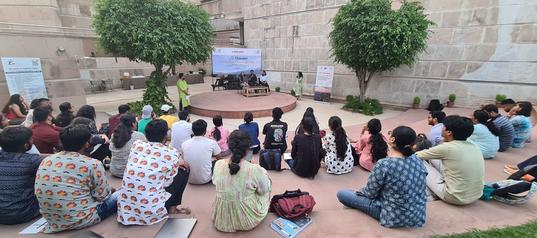There is a plethora of evidence indicating we’re in a climate emergency, negatively affecting everything from the environment to the economy and health across the globe. These impacts affect not only current but also future generations and there is a lot of uncertainty about how bad those impacts might become. Against this backdrop, youth across the world have been taking action - voicing their concerns and highlighting the urgency of tackling climate change in the same way world leaders would tackle any other emergency.
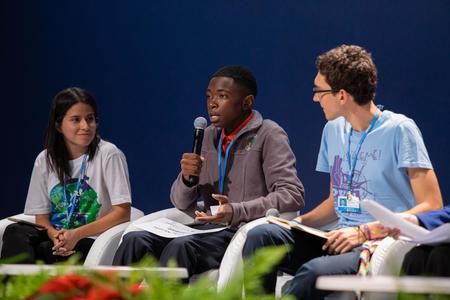
During the annual Conference of the Parties (COP) each year, policymakers come together to discuss and share their climate commitments, ambitions, and targets and to find ways of going further and faster. Despite, this the 2022 Emissions Gap Report by UNEP has emphasised the inadequacy of climate pledges by nations to fulfil their 2030 climate promises and called for the reassessment of global climate commitments and actions.
Why we need to increase youth representation in climate discourse
The large and growing youth population in the Global South will increase stress on natural resources and demand for faster job creation. As a result, the IPCC has recognised youth and children as particularly vulnerable to the impacts of climate change and has highlighted the need for focused support to ensure their future. This has placed youth at the forefront of the climate emergency, leading to global mobilisation in the form of movements and protests demanding climate action from governments, corporates and institutions. While such movements are providing a global platform for youth to participate in the climate discourse, decision-makers should facilitate this participation in a sustained formalised manner for better implementation of climate plans.
India in the spotlight: Youth climate leadership driving subnational climate action
Globally, as well as in India, the importance of youth climate action has become more pertinent than ever before. With India updating its near-term 2030 NDC goals and setting a net zero target of 2070, the urgency of the climate crisis here is evident. To support more robust action, Indian states and union territories are doing their part, even while experiencing their own unique challenges and capacity issues.
States, besides collaborating with civil society organisations (e.g., Maharashtra, Uttar Pradesh, Punjab) and academic institutions (e.g. Gujarat) are also building youth leadership in their regions. Working alongside bureaucratic and political leaders, these young, dynamic individuals from a range of backgrounds are championing and catalysing state-level initiatives and programs while supporting Indian states in revising the State Action Plan on Climate Change.
Youth-led subnational climate action in India
Maharashtra
During 2021-22, the Environment and Climate Change Department of the Government of Maharashtra instituted several young experts as ‘Climate Fellows’ to work on themes like waste management, biodiversity, renewable energy and water conservation. The Fellows also helped the state to build its climate narrative, provided technical and policy inputs and were given the role of strategic advisors to the senior leadership and bureaucracy.
Youth climate leadership needs to be at the forefront of climate action. The diverse and nuanced experiences that young people bring to the table need to be championed. I am delighted to see the UN Climate Change High-Level Champions continue to foster this work by engaging young professionals in strategic dialogues driving global climate discourse. To ensure this, it is also imperative for subnational governments to enhance their ambition and complement national efforts. I commend The Climate Group for championing the State Climate Fellows initiative catalysing state climate action in India.
Youth climate leadership needs to be at the forefront of climate action. The diverse and nuanced experiences that young people bring to the table need to be championed. I am delighted to see the UN Climate Change High-Level Champions continue to foster this work by engaging young professionals in strategic dialogues driving global climate discourse. To ensure this, it is also imperative for subnational governments to enhance their ambition and complement national efforts. I commend The Climate Group for championing the State Climate Fellows initiative catalysing state climate action in India.
Chief Minister’s Urban Leaders Fellowship (CMULF), Government of NCT of Delhi
The Government of Delhi's Chief Minister’s Urban Leaders Fellowship (CMULF) programme provides opportunities to young experts and leaders across India. The Fellows work on some of the most pressing urban challenges within Delhi NCR, especially focusing on environment, transport and infrastructure. The Fellows are involved in broad functions like policy design and implementation, governance and monitoring and evaluation.
Chief Minister’s Fellowship Programme, Tamil Nadu
Last year the Government of Tamil Nadu launched the Tamil Nadu Chief Minister's Fellowship Programme (TNCMFP), which runs from 2022 to 2024. This is employing young experts in strengthening the state’s governance mechanisms, while allowing them to work on areas like water resources and agricultural production and focus on data-driven decision-making.
Climate Group’s ‘State Climate Fellowships’
Climate Group, in partnership with the Swaniti Initiative and with support from the Stichting SED Fund, launched the State Climate Fellows initiative in 2021. During Phase 1, young professionals were deployed across key departments in Assam, Bihar, Chhattisgarh, Madhya Pradesh and Tripura. Here, they championed state strategies and helped align them with state-specific climate priorities. The Fellows provided technical expertise and strengthened coordination among stakeholders, both within and outside the state.
We recently launched the second phase of this programme for 2023-24 - expanding our support to other geographies. As well as sustaining support for Madhya Pradesh and Tripura, we aim to boost the technical capacities of West Bengal, Punjab and Ladakh.
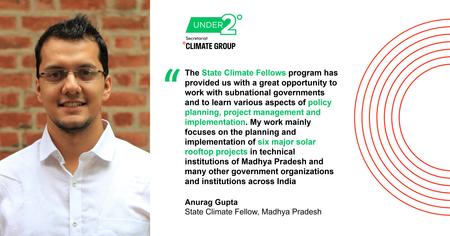
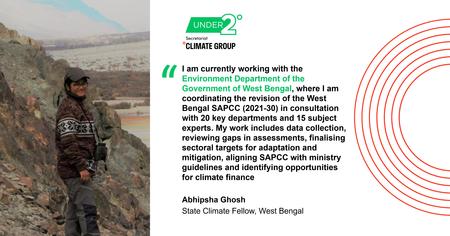
Youth representation at UNFCCC, COP and during India’s G20 Presidency
The UN Climate Change Conference of Youth (COY) is an annual event, which takes place in the margins of COPs. Last year, the Egyptian COP Presidency made history at COP27 by appointing the first-ever COP Youth Envoy and by facilitating the Children and Youth Pavilion and the first-ever youth-led Climate Forum.
The 17th COY - COY17 - in Sharm El-Sheikh saw over 1,000 young people from more than 140 nations gather during the COP27 Youth and Future Generation Day, where they presented the Global Youth Statement. This statement emphasised key policy asks compiled by global youth for inclusion in COP27 discussions and negotiations on areas such as adaptation, resilience, climate finance, climate justice and energy.
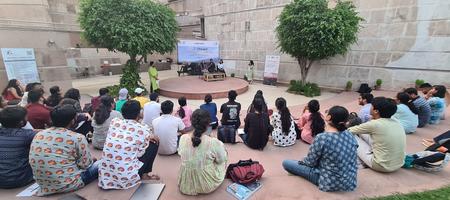
At the same time, the Ministry of Environment, Forest and Climate Change (Government of India) and the United Nations Development Programme (UNDP) jointly launched the “In Our LiFEtime” campaign to encourage youth representatives to become the voice of sustainable lifestyles at COP27. Shri Bhupender Yadav, the Union Minister for Environment Forest and Climate Change, acknowledged the role played by today's youth in climate discourse and recognised them as key stakeholders for climate action.
Holding the G20 Presidency this year has given India significant opportunities to leverage climate action around biodiversity, energy transition and climate finance, particularly through the engagement groups of the G20 Secretariat. Among these, Youth20 (Y20) - the official G20 youth consultation forum - has been facilitating conversations around a number of global topics - with climate change and disaster risk reduction one of its five themes.

There have also been a variety of side events taking place under the leadership of the Y20 Secretariat, including a Y20 Chaupal organised in partnership with Climate Group on 24 April titled ‘Accelerating low carbon initiatives at the subnational level via youth climate leadership’. More than 50 students and young professionals from across Delhi NCR took part.
Moving to a more positive future
Increasing the representation of youth in climate discourse is essential for successful climate action, and providing them with a platform to voice their opinions and concerns about climate and environment-related topics can help to democratise that action. Governments can support this by hosting more public consultations and allowing youth to submit their suggestions to decision-makers.
However, this must go hand-in-hand with an increased availability of green jobs and discussions around how best to adapt to a changing climate. Young people need to be involved in the shaping of their own futures and in making those futures a success.
